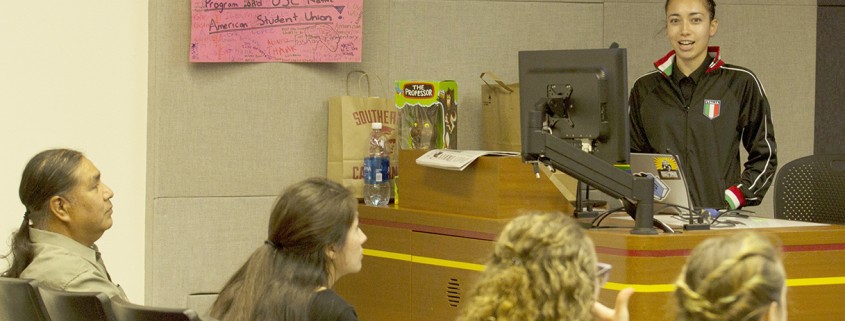Event discusses role of Native-American history in education
Students, faculty and alumni discussed Native American history and its role in education in the Taper Hall of Humanities on Tuesday night. The event, entitled “Reclaim Your Narrative: Indigenous America post-1492,” was sponsored by the Academic Culture Assembly for EdMonth.
Taking place each March, EdMonth is a student-led series of events centered on a discussion of the current state of education in America. Its goal is to engage students in discussions about education as an important social and political issue. This year’s theme is titled “Reclaim-Recenter-Rebuild” with the aim of reestablishing standards, pinpointing systematic issues and remodeling the educational system with clear goals in mind.
The event began with a presentation from Ava Burnell, president of the Native American Student Union at USC. Burnell focused on the common themes across Native Americans’ educational history such as assimilation.
“By law, Native-American families were required to put their children into Christian boarding schools which stripped them of their culture,” Burnell said. “The schools prided themselves on the immersion into Western culture like the cutting of the hair and the removal of the traditional garb. When we hear about things like slavery and plantations, we think of the South being far removed from us. There were lots of tragic things happening to Native Americans and their education in California, right where we are.”
The conversation shifted to the state of Native-American education in the United States in the present day with a presentation from Timothy Vizthum, the teacher advisor of the Indian Education Program of the Los Angeles Unified School District.
“In school, the kids get the image of what Indian means through history classes,” Vizthum said. “Mentally say that’s not me, and that affects their identity because we limited the space that they can exist in. The feathers, dreamcatchers and drums are not the spaces most of our students live in.”
In addition to pushing for a curriculum that is relevant to American Indians and Alaskan Natives, representatives from the LAUSD Indian Education Program visit classrooms to present model lessons that are culturally relevant to give Native-Americans a space to identify.
“The Indian Education Program’s goal is to take the Indian out of the history books and show that there is a mosaic and community,” Vizthum said. “We want to show that no matter where you’re from you will be able to identify with others.”
The event concluded with a talk from Kieras Wilson, a full-blooded Native-American and former USC Admissions staff member. Wilson shared the importance of Native-American programming in colleges to garner a sense of connection among indigenous peoples on campuses across the United States.
“There weren’t higher educational programs back then like there were now,” Wilson said. “My schoolwork was really hard being a full-blood Indian. It was hard for people to understand and believe what I was saying in my papers. I couldn’t present evidence for my papers because there wasn’t any out there.”
Next week will conclude EdMonth for the 2015-2016 academic year. Future events and topics of discussion include the representation of queer history in high school textbooks, the role of sex-ed in public education and an immersive event at St. Mark’s Lutheran Church titled “Building Community Around Food: Cooking Justice with Groceryships.”

